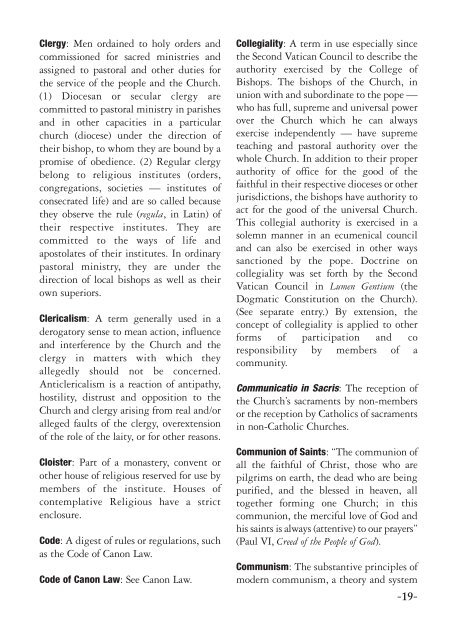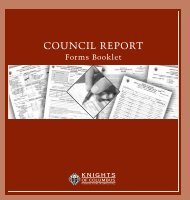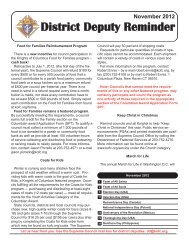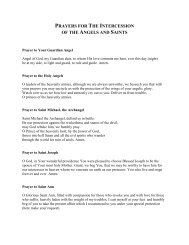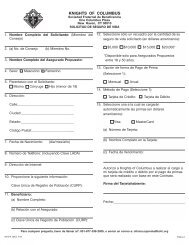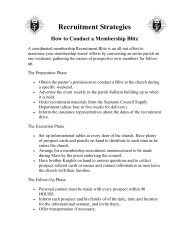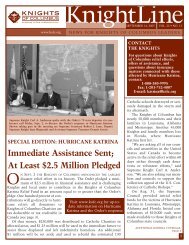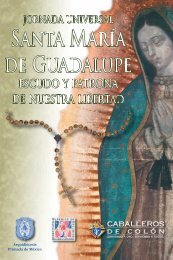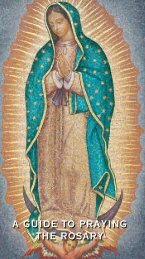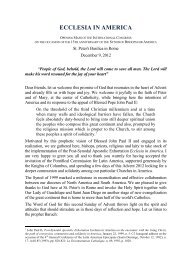CATHOLIC WORD BOOK - Knights of Columbus, Supreme Council
CATHOLIC WORD BOOK - Knights of Columbus, Supreme Council
CATHOLIC WORD BOOK - Knights of Columbus, Supreme Council
You also want an ePaper? Increase the reach of your titles
YUMPU automatically turns print PDFs into web optimized ePapers that Google loves.
Clergy: Men ordained to holy orders and<br />
commissioned for sacred ministries and<br />
assigned to pastoral and other duties for<br />
the service <strong>of</strong> the people and the Church.<br />
(1) Diocesan or secular clergy are<br />
committed to pastoral ministry in parishes<br />
and in other capacities in a particular<br />
church (diocese) under the direction <strong>of</strong><br />
their bishop, to whom they are bound by a<br />
promise <strong>of</strong> obedience. (2) Regular clergy<br />
belong to religious institutes (orders,<br />
congregations, societies — institutes <strong>of</strong><br />
consecrated life) and are so called because<br />
they observe the rule (regula, in Latin) <strong>of</strong><br />
their respective institutes. They are<br />
committed to the ways <strong>of</strong> life and<br />
apostolates <strong>of</strong> their institutes. In ordinary<br />
pastoral ministry, they are under the<br />
direction <strong>of</strong> local bishops as well as their<br />
own superiors.<br />
Clericalism: A term generally used in a<br />
derogatory sense to mean action, influence<br />
and interference by the Church and the<br />
clergy in matters with which they<br />
allegedly should not be concerned.<br />
Anticlericalism is a reaction <strong>of</strong> antipathy,<br />
hostility, distrust and opposition to the<br />
Church and clergy arising from real and/or<br />
alleged faults <strong>of</strong> the clergy, overextension<br />
<strong>of</strong> the role <strong>of</strong> the laity, or for other reasons.<br />
Cloister: Part <strong>of</strong> a monastery, convent or<br />
other house <strong>of</strong> religious reserved for use by<br />
members <strong>of</strong> the institute. Houses <strong>of</strong><br />
contemplative Religious have a strict<br />
enclosure.<br />
Code: A digest <strong>of</strong> rules or regulations, such<br />
as the Code <strong>of</strong> Canon Law.<br />
Code <strong>of</strong> Canon Law: See Canon Law.<br />
Collegiality: A term in use especially since<br />
the Second Vatican <strong>Council</strong> to describe the<br />
authority exercised by the College <strong>of</strong><br />
Bishops. The bishops <strong>of</strong> the Church, in<br />
union with and subordinate to the pope —<br />
who has full, supreme and universal power<br />
over the Church which he can always<br />
exercise independently — have supreme<br />
teaching and pastoral authority over the<br />
whole Church. In addition to their proper<br />
authority <strong>of</strong> <strong>of</strong>fice for the good <strong>of</strong> the<br />
faithful in their respective dioceses or other<br />
jurisdictions, the bishops have authority to<br />
act for the good <strong>of</strong> the universal Church.<br />
This collegial authority is exercised in a<br />
solemn manner in an ecumenical council<br />
and can also be exercised in other ways<br />
sanctioned by the pope. Doctrine on<br />
collegiality was set forth by the Second<br />
Vatican <strong>Council</strong> in Lumen Gentium (the<br />
Dogmatic Constitution on the Church).<br />
(See separate entry.) By extension, the<br />
concept <strong>of</strong> collegiality is applied to other<br />
forms <strong>of</strong> participation and co<br />
responsibility by members <strong>of</strong> a<br />
community.<br />
Communicatio in Sacris: The reception <strong>of</strong><br />
the Church’s sacraments by non-members<br />
or the reception by Catholics <strong>of</strong> sacraments<br />
in non-Catholic Churches.<br />
Communion <strong>of</strong> Saints: “The communion <strong>of</strong><br />
all the faithful <strong>of</strong> Christ, those who are<br />
pilgrims on earth, the dead who are being<br />
purified, and the blessed in heaven, all<br />
together forming one Church; in this<br />
communion, the merciful love <strong>of</strong> God and<br />
his saints is always (attentive) to our prayers”<br />
(Paul VI, Creed <strong>of</strong> the People <strong>of</strong> God).<br />
Communism: The substantive principles <strong>of</strong><br />
modern communism, a theory and system<br />
-19-


